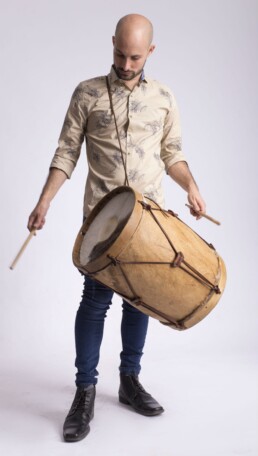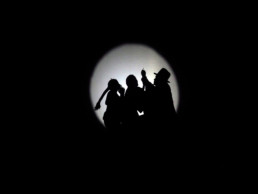The ones you see
The ones you see
It is so easy to forget that it’s hard. Almost impossible. We see their face; we see them smile and enjoy and we hear their voices. And it looks, oh- so easy. But behind that singer there are thousands of hours of preparation and no microphone to amplified them. That is the mark of an opera singer.
Chapter 1: Marketing has sold us the idea that anyone with a voice can be a star, an artist. It’s a lie. In all this programs, an empire and a merchant are behind the product. They will manipulate the talent they manage – because, yes, there is a lot of talent. They will shape it, pack it, create something they can sell, turn the mic and spotlight on and throw you in the ring. Suddenly, you will be their star. If they can’t sell their creation, they will dispose of it. They will turn you off, and search again.
Chapter 2: You can’t turn off the mic or spotlight of a real artist. The light is inside: the tenacity of recovering at each mistake. The nerves of steel of confronting the audience with nothing to protect them. The generosity of been extreme vulnerable in front of strangers. The gift of giving, even if they are hurting. The curiosity of a child. The discipline of an Olympian. They survive the training, walk on stage and shine. So, we think it’s easy. Trust me: it is not. They are fragile like crystal but manage to find the strength and will not run away in the storm.
Working again with them is a gift. Hard to describe what we can feel when they sing. So, we stay silent and in awe. And we listen and feel gratefull…
Image:@markusspiske
Rest day
Rest day.
Only the crocodile remains in the room. No socializing. No exploring Houston. It would be too irresponsible. A good day to rest and read.
New world, new rules: the theatre
New world, new rules: the theatre
Gone are the days when we saw the performance space on day one. Safety first, and it requires careful planning for safety, as zones are controlled for tracing, and teams are tremendously reduced. On my fourth day, I am finally allowed to see the Cullen Theatre, the home of HGO Digital– Sarah and Ernest Butler Performance Series . I’d forgotten the magic of walking on a new space. Love it!
HGO Digital. You will see it on a screen, but we work on a theatre, that has been carefully mapped for the occasion: designers, production, supporting teams: all working together but now far away. A lonely stage manager. Whatever it takes, but we keep working. My right hands will not be on my right, and actually, one will be in NYC.
Four cameras, the closest one to stage and the performers on a mechanical rail. Support on stage will be behind new plastic walls during tech, but only performers when we finally tape.I will not be looking at the stage, but at a huge screen with all the camara shots. So many new aspects to keep in mind – and “cross stage left” has become “pan right”. I know I will be engaged in a screen and a proscenium at the same time. All new and exciting, so no fear at sight.
Once done, there will be no applause: and that will be hard for the performers. We techies are used to back stage. But still: a LIVE show is a triangle: back stage, on stage, and the audience. We’ve lost the audience, and it’s hard to ignore that flat line. Once done, we will keep working and editing. And the premiere will happen 2 weeks later. With everyone on their own house.
There will be no main down, and no screams and hugs behind it. We will take a remote and turn our TV off. Silence will follow. It’s a brave new world. Can I tell you how much I am adoring those who have not given up?
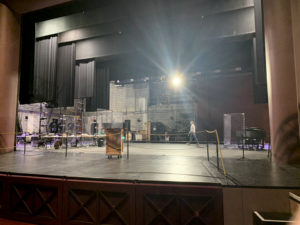
Nothing
Nothing
We prepare for months in advance. I researched all the way back to Isabel la Católica. Got reconnected with Antonio Machado and Miguel Hernandez. Discover the drastic differences between Spain’s regions and why they fight so much to keep their identity and language.
I revisited my education on Spaniard conquest, understood how Spain is really a “casual” mix of races, religions and geography. School books lie, and history is told by those in power. It has become fashionable to push away the “invaders”, but the color of my skin tells me that I am the result of those mixes. My best discovery: zarzuela came of the people, by the people and for the people, and so, it should not perish. It got kidnapped and sanitized. But its roots are the purest and simple feelings, without much decoration. People, the heroes, the fighters, the rebels, the true and the unfaithful, soldiers, thieves, gypsies, pirates, bookkeepers, dreamers, tailors, bar owners. Simple people. Us. I have fallen in love with Spain and Zarzuela. I will admit it, in this time where as a Latin, it would be politically incorrect. But it is in my blood. As much as the Quitus. But this is a part of a longer story.
We prepare for months. We plan and then in rehearsals, collaboration starts to polish our thoughts, and the amazing talent of the people we work with will allow only the best thoughts to remain. It is draining, just as much as it is exciting. But last night, I came and vegged out. For the first time ever, I wanted to do nothing. I saw the closing of Dickinson and of Wandavision, half awake and half asleep. Then I slept. Nothing.
Today, after that very normal melting day, I am recharged and ready to tight up and close what has been a magical first week of rehearsals. One more cup of coffee, and life is back to normal…
Sweat
Sweat
Blurfed is gone. It took one second! Let me share the good news, because I’m breathing again: rehearsing!!! We who love what we do will recover in seconds. Just give us the opportunity! An explosion of energy: flamenco! Quiebres, pasos, postales, mantilla y abanicos. Tables, chairs and a walking stick.
Step, kick, kick, leap, kick, break…. again!
Step, kick, kick, leap, kick, break…. again!
Masks, visors… and then, touch. Sweating, chemistry, distance and yes, contact. Dancers seducing the air around them
Step, kick, kick, leap, kick, touch…. again!
Step, kick, kick, leap, kick, touch…. again!
I think it rained today. The air feels clear. I can breathe again….
Blurfed
Blurfed
If you can’t guess how day 1 starts, you skipped 2020. Yes, we all did. Most of it, anyway. And it is still crawling into this year, while the brave keep moving forward. The arts have been abandoned by the times, and there are new words that need to come out and bring some light again. I feel blurfed. Yes, I just made up the word. I can say it, and it feels what I feel: it has energy on a dark vowel, and it hits percussively at the end while it jumps forward. It accepts to be tired, but it’s ready to begin again. I like the sound and at the end, it pulls a smile out. So, I decided: I feel blurfed. ▣
Artist (and I mean the creators, the performers and the supporters – now that we understand how complex our art forms are- ), artists, want to create. Our spaces are closed, diminished, affected, abandoned. Art reflects the times, even when they are these confusing. And artists absorb and transform that energy. It’s draining. Yes, we aim to entertain, and the show must go on. Blurfed. But sometimes, we want to ask questions, as we like it. And walk around to get inspired because all the world’s a stage only to realize, we are merely players. Blurfed.
Yes, yes. I tested negative: yey! I did not meet most of the team: I saw them on a screen, in a waltz that kept switching the pieces. It took me a while to find the small face that was speaking. And as I did, the yellow frame switched: you know the zoom-dance. And if we meet, I hope to recognize them, because I will mostly see only their eyes above their masks behind their visor. We must keep safe to create. I am incredibly excited to be active. I am so thankful for those who pass the blurf, smile, stand up and walk. Cheers to you all!
Salud!
The things we pack
The things we pack
So, sooo many times I packed really quick, never caring if I forgot something. A great friend told me once: “it will be an opportunity to get…. new pants, a toothbrush, socks, band-aids” you get my point. But packing now, COVID times which means little production support, (oh how we can feel their absence now) a week after the blizzard in Texas required concentration: forgetting something might become a problem. Don’t get me wrong I’m so excited to work again. I just talk about new necessities when we travel… Companies are struggling, I miss production teams and the many smiley faces we got so used to, without necessarily knowing how many aspects of our life they were solving. Simple things like water. I miss them, above all, I hope they have an income and are doing ok.
Things I never packed before: hand sanitizer, alcohol spray, a collection of masks: disposable, comfortable to work with, elegant, informal, visors, thermometer, paracetamol. Dry cleaning and washing might be an issue, so pack enough clothes for 15 days. We are in “Zoom” times, so gadgets feast: computer, chargers, batteries, headset, iPad, iPad pencil, USBs and all the cables that match everything. Desk necessities as business centers mostly remain closed, and I do not want to touch anonymous desk clip. Coffee! I passed from downtown Austin to downtown Houston. I don’t have a car, I don’t want a car. Walking I found so many stores and markets closed. New and very restrictive schedules. 24/7 corner stores and restaurants are basically gone for now, few can afford that, and I get it. I just need to remember it. Tim O’Brien reminds us that we carried things largely determined by necessity. And when towns feel ghostly or empty, and buying a band-aid can become a battle, we suddenly start carrying more things. So. I’m thankful that my suitcases expand, and that the wheels carry the weight.
Passport, cell phone, wallet, and comfortable shoes, it was my only checklist when I travel before.
But now, life feels like war.
Hundiendo a Quito
Quito, 21 de enero, 2021
Hundiendo a Quito
hundir: v.tr. 1. Sumir, meter en lo hondo 2. Fig. Abrumar, oprimir. 3. Fig. Confundir a uno. 4. Destruir, arruinar
Las declaraciones y la voz sarcástica de Sebastián Sacoto, el actual Director de Creatividad, Cultura y Patrimonio de la Secretaría de Cultura de Quito, dejan en evidencia su falta de respeto y conocimiento del sector que maneja. Los incómodos intentos por diluir sus ataques con bromas, pretenden convertirnos en cómplices de su perversidad. El discurso de quien habla con escaso conocimiento llevará siempre errores que reflejan su ignorancia. Quizás por esto, el Secretario de Cultura ha tomado otra medida: la ausencia total.
Diego Jara, no logrará jamás entender el sector que gestiona: su conexión con los artistas se reduce a vender su producto. No confundamos comerciar con apoyar, y este secretario usa la palabra “equipo” (team) como bandera, pero jamás ha sudado en la cancha. Ha implantado una acción mercenaria en el sector, y piensa que ganan mientras menos competencia dejan. Y así encontraremos una cadena de heridos de esta gestión, siendo la Fundación Quito Eterno solo el herido más reciente. (1) La cultura es una de las grandes víctimas de la pandemia, y la carencia de líderes que la apoye terminará enterrando muchas de sus instituciones.
Hace algunos días circularon 4 audios de una reunión mantenida el 4 de noviembre entre el Sr. Sacoto y su equipo. Ante la reciente entrevista publicada por El Comercio (2) justifica su desdén llamándolo “una broma interna.” Intuyo que nadie se ríe ante esos insultos, y la difusión anónima de los audios es un grito silencioso ante la tiranía de sus líderes.
Los audios 3 y 4 no los menciona El Comercio, pero son dignos de ser estudiados y cuestionados :
“Como Director de Creatividad, Cultura y Patrimonio… yo apunto a lo mismo que cuando comenzamos… yo quiero darle en la trompa a la Fundación Museos y yo quiero destronar el Museo de la Ciudad y eso se logra con un CCM fortalecido. Entonces, ese es mi horizonte, para eso voy a pelear y eso es lo que yo quiero. Necesito mis argumentos técnicos para poder seguir peleando estas… recursos humanos, recursos económicos y todo… incluso en vacas flacas.”
“(…) si por nuestra gestión nosotros terminamos haciendo que se municipalice toda la Fundación Museos de la Ciudad, pues, qué pena. Porque la verdad yo quiero restregarles en la cara todo lo que nosotros hemos venido haciendo y logrando. Sin recursos, sin quejarnos, sin estar llorándole a nadie…”
Este es el defensor de nuestro patrimonio elegido por el Secretario. El líder que busca hundir el equipo. Los “lloros” es el reclamo justificado de sueldos no pagados así como obligaciones adquiridas por convenios ignorados. Jara y Sacoto se han quedado en la anécdota, y sus instrumentos de gestión son básicos: la mejor defensa es el ataque. No han pasado los presupuestos asignados. Han llenado a todos con informes interminables para justificar su tardanza. Han afectado a espacios, actores, bibliotecas y gestión por igual: los han convertido en mendigos. Además, perpetúan una opinión errada y dañina empezada por otra Secretaria de Cultura, Mariana Andrade.
Su corta gestión tuvo una sola consecuencia: crear la falsa idea de que las Fundaciones se llevan la mayor parte del presupuesto de la SECU. Estoy cansada de aclarar la errada tergiversión de la verdad: el 70% del presupuesto de la FTNS es gasto de inversión y sí, una gran mayoría está asignado salarios. No son salarios exorbitantes, y refleja el enorme esfuerzo que una gran parte de los trabajadores pone, con interminables días y semanas de trabajo intenso. Es dinero gestionado por las Fundaciones que se utiliza mayormente en contrataciones nacionales en el sector cultura. Es decir, presupuesto asignado, invertido en el Sector Cultural.
Crear un salario estable para todo artista o trabajador del sector cultural debería ser una meta de todo Secretario de Cultura; y es derecho de todo trabajador del sector. ¿Cómo se pretende mejorar al sector “dando en la trompa” al compañero y destronando a quien ha logrado fortalecerse? ¿Cómo justifican los líderes su misión de “quitarles fuerza a las Fundaciones”?¿Por qué las iras y el menosprecio a una institución que logró gestionar con éxito? ¿Qué ganó Quito debilitando a los gestores fuertes? Nada.
Conocí al señor Jara en la transición. Resultó ser un lobo disfrazado de oveja, y apenas entró a la cabeza, quedó muy claro que su conocimiento se reduce a enriquecerse de el arte de otros: no es un creador ni un gestor, y nunca ha contribuido al sector. Por tanto, es incapaz de tener empatía con los creadores, los artistas, aquellos que alimentan a la ciudad con su arte.
He estado fuera de Quito 18 meses, y al volver encuentro una ciudad liderada por un alcalde invisible. Un gallito de pelea que arenga a la destrucción del patrimonio que debe cuidar; un Secretario de Cultura más ausente que el Alcalde, escondido y ordenando gastos incomprensibles: más de $500.000 en Fiestas de Quito virtuales. Líderes orgulloso de gestionar conciertos gratis sin pagar a los artistas, y alardeando de la gestión “sin recursos”: se agradece a los artistas, pero aparentemente, no son dignos de ser compensados. Con este tipo de gestor, el dinero se quedará siempre en la telaraña de administradores y marqueteros mercenarios.
Quito: despierta, y demanda un Alcalde que por lo menos asome en el Consejo. Transparencia en elegir sus líderes. Qué paren los dedazos. ¿Por qué tan callados? Aunque absurdo, parece ser el momento de gritar “¿y ahora, quién podrá defendernos?” y esperar que llegue por lo menos un Chapulín? Es momento de un cambio. Si la ciudad no defiende a sus artistas, este Municipio conseguirá algo imposible pero ya en marcha: callar la voz de esta ciudad rebelde.
Chía Patiño
Música
Directora FTNS 2009-2019
Share | Comparte
Juan Iñaki: “Hacer un musical fue un cachetazo”
Juan Iñaki: “Hacer un musical fue un cachetazo”
Por Agustin Liotta
HOY DÍA CÓRDOBA
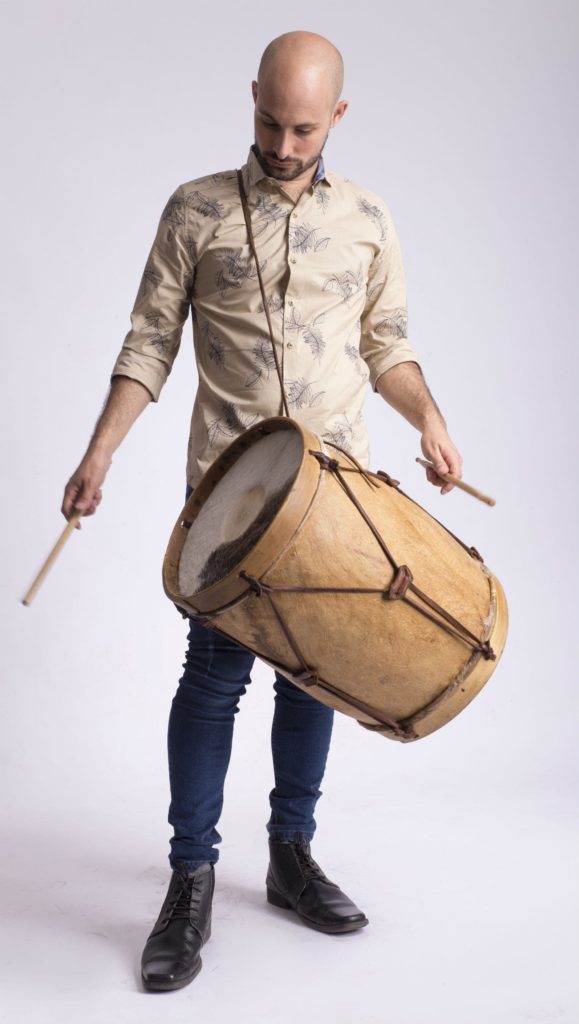
Entrevista Juan Iñaki lanzó “Aquí y ahora” su nuevo disco que presenta este viernes en nuestra ciudad. En una charla con este diario habló de su participación en “Los Miserables”, sus viajes y su carrera
El cordobés Juan Iñaki comenzó desde pequeño a cantar y a lo largo de su carrera compartió escenarios con importantes artistas tanto nacionales como extranjeros, como Lila Downs, Raly Barrionuevo, Dúo Coplanacu, Raúl Carnota, Carmen Paris y Jorge Fandermole, entre otros. De chico decidió perfeccionarse en canto lírico y eso, sin que lo supiera, lo llevó a formar parte del elenco de “Los Miserables”, comedia musical que se montó en Ecuador.
Por estos días se encuentra de gira con la presentación de “Aquí y ahora”, su más reciente disco que se logró en tan solo dos meses de ensayo y grabación, con ideas que le venían dando vuelta en la cabeza desde hace un tiempo. En Córdoba, su ciudad natal, la cita es este viernes a las 21:30, en el Teatro Real.
Hoy Día Córdoba (HDC): De los viajes que realizaste por el mundo, ¿qué te dejaron para tu carrera?
Juan Iñaki (JI): Tengo la suerte de que mi camino me lleva a otros lugares todo el tiempo, a lugares que de otro modo no hubiera conocido. Lo más lindo que me dieron es sacarle el jugo a las situaciones en las que la música me agarro por sorpresa. No es algo pasado sino que sigue sucediendo. Lo que sí puedo decir es que poder retratar Córdoba con otra mirada, me dio la posibilidad de ver otras cosas.
HDC: ¿Esos viajes te permitieron salir de la vorágine de los escenarios?
JI: No, porque los viajes son vorágines y viajo por trabajo. El placer está presente en todo momento porque tengo la suerte de vivir de lo que amo y en contacto con la música soy feliz, es mi goce constante, y mi trabajo también. Ahora me siento ansioso por la presentación del disco porque presentarlo en el lugar donde uno vive tiene algo muy especial.
HDC: ¿Cuál de tus experiencias en el escenario fue la que más te marcó?
JI: Haber protagonizado “Los Miserables” fue algo maravilloso que nunca lo busqué. Aprendí mucho en ese tiempo. Otros momentos que me quedan en el recuerdo son haber teloneado a Caetano Veloso y haber cantando con Lila Downs. Conversar con ella y sentir su cariño son cosas que valoro mucho. Este amor de mis seres queridos me ordena y me encamina.
HDC: ¿Cómo fue eso de “Los Miserables”?
JI: Yo estaba en un festival de Bilbao (España) y me vio la directora de la obra. Ella fue a buscar un tenor español y le pareció que tenía que ser yo. Al año ya pasé a formar parte de la obra. A mí me gustaba la ópera pero tenía un preconcepto con el musical. Me parecía un género menor y fue un cachetazo de aprendizaje el desafío actoral.
HDC: Perteneces a la generación de Abel Pintos y la Sole, ¿Cómo ves esa camada de artistas?
JI: Hoy los veo con mucho más cariño. En ese momento, a finales de los ’90, hubo un boom de niños cantando folklore y yo quería despegarme de eso. Los padres proyectaban mucho sobre los niños. Una vez, Soledad me preguntó si cantaba porque yo quería o porque mis padres me obligaban. ¡Era mi deseo! Ella fue la gran referencia de ese tiempo y yo no era consciente del aporte que hizo. Era casi impensado que una chica que cantaba con bombos sonara en boliches y haya despertado un gran fanatismo en los jóvenes. Hoy no puedo dejar de valorar eso.
Juan Iñaki presenta “Aquí y ahora” este viernes a las 21:30 en el Teatro Real (San Jerónimo 66). Entradas desde 200 pesos en Autoentrada.com.
Cross-Cultural Hybrids, OPERA America
Cross-Cultural Hybrids
By Charles Shafaieh
OPERA America

While a contemporary staging of a standard-repertory item may impose a radical shift in an opera’s setting — from Rigoletto in Las Vegas to La bohème on the moon — the score itself is usually sacrosanct. Some recent productions, though, have broken this unspoken rule. They incorporate novel, often indigenous, instruments and even the translation of entire scores into new musical idioms, in the process broadening the cultural reach of European classics.
The Teatro Nacional Sucre in Quito, Ecuador, has on its payroll an orchestra of Andean instrumentalists but not a traditional ensemble. This gave the company a logistical rationale to create its new, reorchestrated version of The Magic Flute last year, in Spanish and the indigenous language Kichwa. Chía Patiño, the executive and artistic director of Teatro Sucre, devised a production that emphasized the similarities between Andean and Masonic symbolism. Both belief systems place special emphasis on nature, and the serpent in Mozart’s opera is the symbol of the underworld in Andean mythology. The production drew a significant contingent from Ecuador’s Indian communities, many of whom had never before attended an opera. “The people who would recognize Mozart absolutely did, and for the others, it was storytelling, which is what Mozart was trying to do,” Patiño says.
The Andes Magic Flute follows in the tradition of Vancouver Opera’s 2007 First Nations version. A 2014 South African Magic Flute, from the Cape Town-based Isango Ensemble, grew out of a similar impulse to create cultural connections and expand audiences. “South Africa’s conservative operatic audience has never embraced our work, but the result is fantastic when we play abroad or in the townships or Market Theatre in Johannesburg, where the audience is younger and more mixed,” says Mark Dornford-May, the ensemble’s director and the author of Isango’s Magic Flute libretto. “We try to get The Magic Flute to reflect, as close as possible, Mozart’s dream and desire, but we look at it through a South African prism. Our spirits are more like Motown soul singers rather than choirboys; the flute — not a particularly South African instrument — becomes a trumpet. We can show that cultures have different perspectives on things but that ultimately humanity runs across them all.” Using musical adaptations by Mandisi Dyantyis, Isango has also produced a Bohème, and its Carmen served as the basis for the critically acclaimed 2005 film U-Carmen eKhayelitsha.
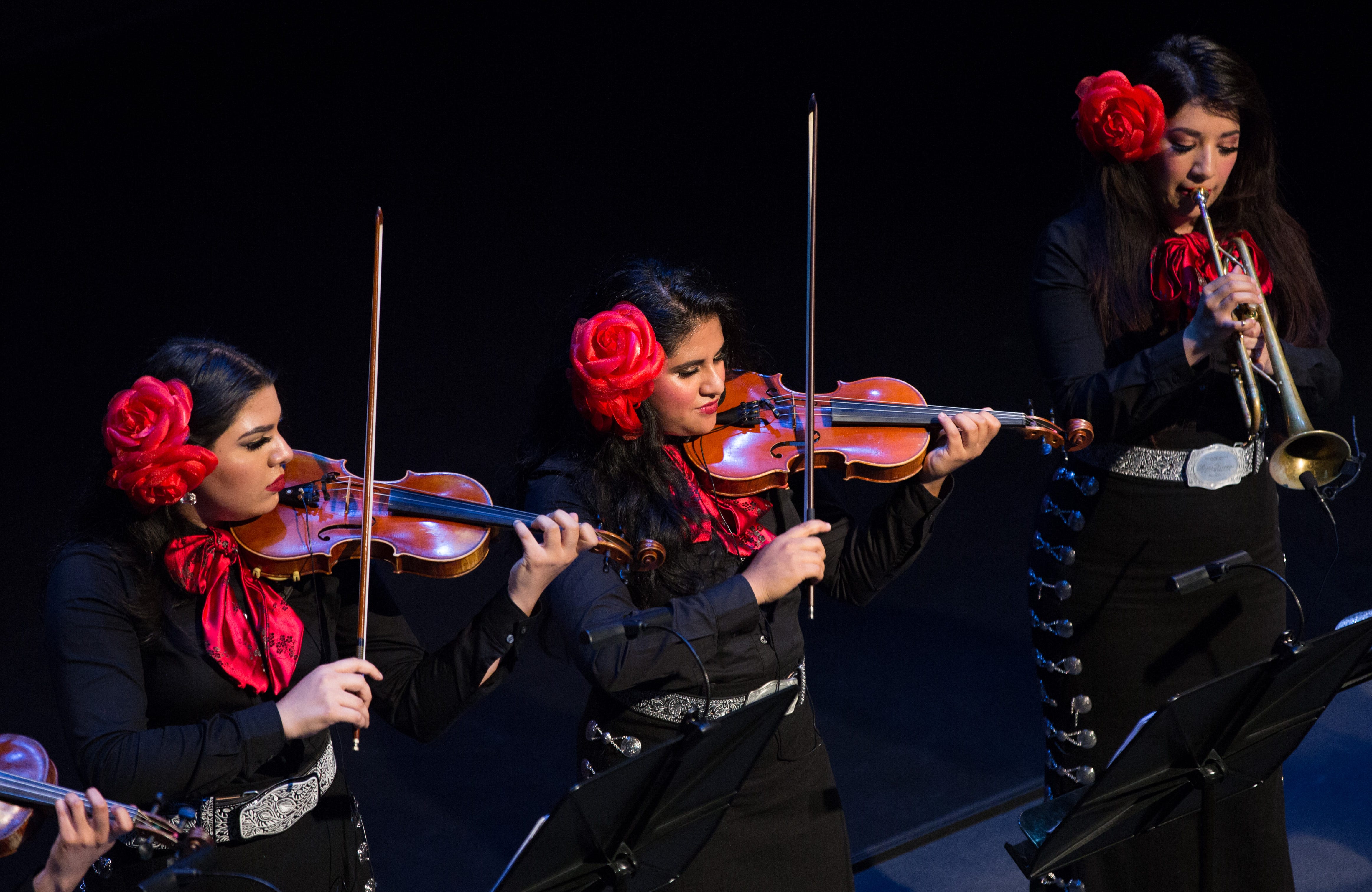
Creators of these adaptations have to navigate the precarious line between insightful innovation and kitschy cultural appropriation. Guadalajara-based visual artist Gonzalo Lebrija grappled with this dilemma when creating Mariachi Wagner for the Dallas Symphony Orchestra’s SOLUNA Festival in 2018, in collaboration with composer Jesús Echevarría. The all-female ensemble Mariachi Rosas Divinas performed a 40-minute program of Wagner excerpts that Lebrija considered an ideal experiment in revealing the similarities between cultures through music. During initial rehearsals, though, the “Wagner” element dominated the music. “It felt false,” says Lebrija. The creative team adjusted the arrangements so that the mariachi flavor came through. Only when it approached both traditions with equal respect could the fusion take honest shape.
These operatic hybrids suggest tactics for bringing diversity to the field, both in the productions themselves and in their audiences. “The confrontation with antiquated music, text and dramaturgy requires an extra amount of inventiveness and creativity to make it work here and now,” says Amsterdam- based playwright and dramaturg Willem Bruls. “But dealing with old forms can create a different, better and more daring result.”
Charles Shafaieh is an arts writer based in New York City. His work has appeared in The New Yorker, Opera News and other publications.
This story originally appeared in the spring 2019 issue of Opera America magazine, the quarterly of the national nonprofit service organization for opera. Members of OPERA America receive the print and digital editions of Opera America magazine as a benefit of membership. Join today.









